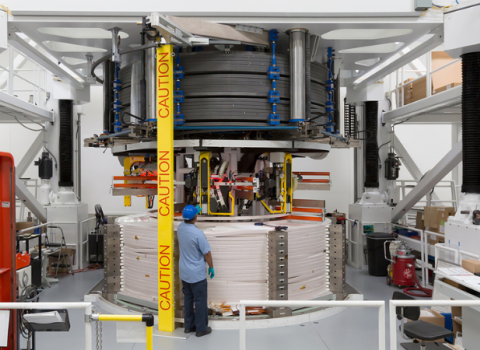Oxford University spin-out seeks to commercialise new implosion processes in fusion reactors for electricity generation
First Light Fusion Limited has completed a fundraising of £22.7 million to advance the commercialisation of new implosion technology that can achieve the high temperatures and compression necessary for fusion reactions.
The Oxford University spin out says its approach has the potential to dramatically shorten the timescale and cost of achieving practical and affordable fusion energy. The funding provides the mean to further develop modelling tools and experimental capability and to fund collaborations with leading research groups in the field.
At the same time First Light announced the formation of scientific advisory board to advise on its development programme, which amongst other experts includes Nobel laureate Steven Chu, the former US Energy Secretary.
The financing round will be completed in two tranches, subject to the attainment of certain milestones. Investors include IP Group plc, Invesco Asset Management Limited, Sandaire Investment Office and Oxford University.
Robert Trezona, IP Group’s Head of Cleantech said First Light is making excellent progress in advancing its technology towards commercial application. “The participation of such high-quality investors alongside IP Group in this fundraising is a testament to the achievements of the First Light team so far. The company’s ability to attract world-class talent to its advisory board is an endorsement of its scientifically rigorous approach to developing its technology.”
Nick Hawker, Chief Technology Officer and co-founder of First Light, said there has been considerable progress in the last eighteen months. “We believe that we have a differentiated approach to developing technology for fusion and these funds will accelerate our vision of [an] affordable, practical and safe energy supply.”
First Light is already working with a number of leading university research groups and the new capital will allow it to expand this programme.
The technology is based on inertial confinement fusion, a well-established research field in the area of clean energy generation. This approach is being pursued in many laboratories worldwide, perhaps most notably in the US at the National Ignition Facility.
First Light is exploring a number of alternative research directions that harness the same fundamental physics, with the prime focus being power generation. Work completed to date has included the theoretical analysis, a detailed numerical simulation and experimental validation. This has allowed the company to define its area of operation and set out a route map to achieving fusion.
The company has also examined the costs and engineering practicalities of building a reactor using its technology and says there are a number of advantages over other approaches.
The technology could also be used in materials processing and chemicals manufacture.
The Oxford University spin out says its approach has the potential to dramatically shorten the timescale and cost of achieving practical and affordable fusion energy. The funding provides the mean to further develop modelling tools and experimental capability and to fund collaborations with leading research groups in the field.
At the same time First Light announced the formation of scientific advisory board to advise on its development programme, which amongst other experts includes Nobel laureate Steven Chu, the former US Energy Secretary.
The financing round will be completed in two tranches, subject to the attainment of certain milestones. Investors include IP Group plc, Invesco Asset Management Limited, Sandaire Investment Office and Oxford University.
Robert Trezona, IP Group’s Head of Cleantech said First Light is making excellent progress in advancing its technology towards commercial application. “The participation of such high-quality investors alongside IP Group in this fundraising is a testament to the achievements of the First Light team so far. The company’s ability to attract world-class talent to its advisory board is an endorsement of its scientifically rigorous approach to developing its technology.”
Nick Hawker, Chief Technology Officer and co-founder of First Light, said there has been considerable progress in the last eighteen months. “We believe that we have a differentiated approach to developing technology for fusion and these funds will accelerate our vision of [an] affordable, practical and safe energy supply.”
First Light is already working with a number of leading university research groups and the new capital will allow it to expand this programme.
The technology is based on inertial confinement fusion, a well-established research field in the area of clean energy generation. This approach is being pursued in many laboratories worldwide, perhaps most notably in the US at the National Ignition Facility.
First Light is exploring a number of alternative research directions that harness the same fundamental physics, with the prime focus being power generation. Work completed to date has included the theoretical analysis, a detailed numerical simulation and experimental validation. This has allowed the company to define its area of operation and set out a route map to achieving fusion.
The company has also examined the costs and engineering practicalities of building a reactor using its technology and says there are a number of advantages over other approaches.
The technology could also be used in materials processing and chemicals manufacture.





 A unique international forum for public research organisations and companies to connect their external engagement with strategic interests around their R&D system.
A unique international forum for public research organisations and companies to connect their external engagement with strategic interests around their R&D system.